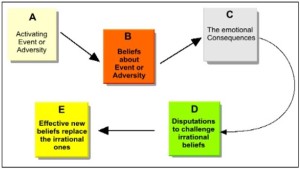
Self-defeating thoughts can have a huge, toxic impact on your life. Being able to recognize them, own them and revise them is key to improving your self-esteem and confidence. Let’s take a look at what I’m talking about.
You and a co-worker are standing by the water cooler and your boss walks by and scowls. Immediately, you think to yourself “oh no! She must be mad at me” and you begin to feel bummed. On the other hand, your co-worker thinks “wow, she must be having a bad day” and feels the same as before.
What’s the difference between you and your co-worker? The experience was the same … you both saw your boss scowl as she walked by.
But what you thought about that experience was different.
In the cognitive therapy world, it has been determined that specific thoughts have a direct impact on your self-esteem and can lead to depression.
According to a psychologist, Albert Ellis, your belief system impacts whether you achieve success in your life. He developed the ABCDE model to teach people how your beliefs about something is what leads to your emotional and behavioral responses.
A is the activating event, B is the irrational belief or automatic thought about A, C is the emotional consequences of having the irrational belief, D is when you dispute or challenge the irrational belief, and E is the emotional effects of the new, revised belief.
This model is based on the premise that your beliefs, or self-talk, about something or someone is what leads you to feeling a certain way.

When you experience something upsetting, your distorted automatic thoughts about it will have a huge impact on your overall mood and your feelings of self-worth.
There are 13 ways we embrace distorted thinking.
1 .Assuming – You know what they say about assume … When you assume you make an ASS out of U and Me (Ass-U-Me)! In the example above, there was an assumption that your boss was mad at you. Before assuming this, you could simply test out your hypothesis by asking your boss if she’s upset with you.
2. Shoulds – the demand you make of yourself such as “I should be happy and not depressed”. This way of thinking will make things worse because you’ll feel inadequate, hopeless, ashamed and/or frustrated. The key here is to replace “should” with “would” or “could” and you’ll have a different effect. For instance, “I could be happy, when I overcome depression”.
3. Fairy Tale Fantasy – this is when you expect the world to be perfect and when it’s not you think “life’s not fair” or “why did that have to happen to me?”. With the fairy tale fantasy there is an unreasonable expectation about life which can lead to grave disappointment. In this case, you can also use “could” or “would” such as “it would be nice if that didn’t happen to me”.
4. All or Nothing Thinking – This is when you expect yourself to be perfect and flawless. The problem is, you aren’t perfect or flawless so when you don’t meet these high expectations – being flawlesss and perfect – you see yourself as a failure. For instance, “If I’m not the best, I’m a big loser”. With this kind of thinking there’s no room for error. If you’re average at something, you’re still a loser. Of course, this isn’t really true. Poor performance doesn’t make you worthless, it just makes you human. So the key here is to challenge yourself. “Why do I need to be the best?”
5. Overgeneralizing – This is when you have a negative experience and you generalize it to everything. For instance, “No one likes me” or “I always ruin everything”. When you overgeneralize, you’re not in reality. The way to correct this type of thinking is to use the word “some” or “sometimes”. For instance, “some people don’t like me” or “Sometimes I ruin things”. This is a more positive way of thinking.
6. Labeling – Using a single word to describe yourself or others. For example, “I’m a total loser”, “I’m stupid”. This is similar to overgeneralizing because it assumes that you’re always stupid. Challenge this by asking “Am I always stupid?” The answer, of course, would be “No. Not always. Just sometimes.”
7. Dwelling on the negative – When you focus only on the negative, you aren’t able to see the positive aspects of a situation. For instance, “The chicken’s burnt so the whole meal is ruined”. A solution to this is to challenge this … “is the whole dinner really ruined? No, the potatoes and veggies taste great!”
8. Rejecting Positive Aspects of Something – This is different than dwelling on the negative. With this one, you’re minimizing the positive aspects. For instance, someone compliments your dress and you say “What, this old dress? It’s been in my closet for years.” The better way to handle this is to simply say “Thank you!”.
9. Unfavorable Comparison to Others – This is when you compare yourself to others and you’re the one that’s inferior. “Wow! Look at Jane, she’s so successful! I’m just a stay-at-home mom.” In this example, you assume that because she’s working she’s successful and you’re not. When the fact is you’re really good at taking care of your kids and managing the household.
10. Catastrophizing – This is when you believe that something is a lot worse than it really is. For instance, “I can’t believe I forgot about the meeting. I’m going to get fired for not going.” Or, as a mother, something I hear quite a bit “What do you mean I’m grounded! You just ruined my life!” When this happens, you should challenge your thinking by asking yourself “What are the chances this will really happen?” or “Is this really true? Is my entire life really ruined?
11. Making it Personal – When something happens and you take all the blame. For instance, you’re spouse is really angry and you think “it’s all my fault that he’s angry”. You’re taking responsibility for someone else’s mood when, in fact, you really aren’t responsible for how they feel.
12. Playing the Blame Game – This is when you don’t take any responsibility. Instead, you blame something or someone else. When you do this, you’re playing the victim. An example would be “my sister ruined my life.” The better way to view this is to say “I don’t like what my sister did but I’m not going to let it affect me.”
And last but not least …
13. Making Feelings Your Reality – This is when you draw a conclusion about something based on how you feel. For instance, if you feel inadequate at something you conclude that you are completely inadequate.
Depression comes about because of distorted thinking and buying into the distortions as if they’re the truth. It’s important to understand that feelings are not always based on reality. As a result, you should challenge your thinking and determine what the truth really is. You can do this by using Albert Ellis’ ABCDE model. When you use the model, you’ll be able to identify and replace your distorted thoughts, strengthen your self-esteem and begin to realize that you are a worthwhile person.
Hugs … because everybody needs one!













